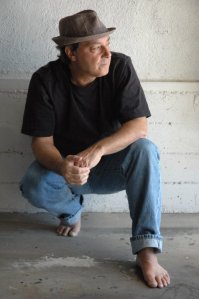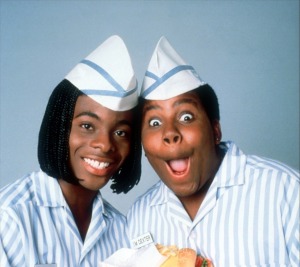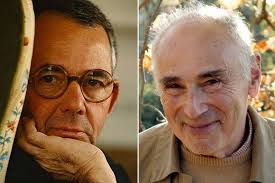Michael Polish [Interview]
May 31, 2013 5 Comments
It is no secret that independent cinema is, in my opinion, where some of the finest stories are told in this day and age. It is literature in plain sight, poetry that is literally in motion. And one film that truly sparked my interest in the independent cinema world was a little film that made big news was the wildly entertaining, Twin Falls Idaho. It was a film that stormed the festival circuits, and made heroes out of Michael and Mark Polish. The left Sundance with the Grand Jury Prize, and have never looked back. The have become the masterminds of film, and Michael Polish has become one of the most well respected filmmakers of now. Hey, he managed to bag the beautiful Kate Bosworth, so he must be doing something right!
And as if other films like The Astronaut Farmer and Northfolk. weren’t enough to solidify this cat as one of the day’s greats, he has moved onto some even more sensational territory – The Beat Generation. For those of you who know me personally, you will know that the Beats are an extremely influential part of my life. Almost everything I do in my own work, I tend to try and reflect to this beautiful creatures. And one of my favorite novels from the era was Kerouac’s mildly renowned book Big Sur, which didn’t receive nearly as much credit as it deserves. And with the somewhat disappointed take I had on the recent adaptation of On The Road, I am delighted to know that Michael Polish is going to be the man behind the lense for the Big Sur’s adaptation. Not to talk smack about Walter Salles and the work he put into creating his film….but this is an Kerouac adaptation that is completely Kristen Steward free. And as pretentious as that may seem, that is all I really need to enjoy a Kerouac adaptation.
So, ladies and gentlemen, I am pleased and extremely honored to introduce a man who should need no introduction at all….the great and legendary writer, producer, director, overall film genius, Mr. Michael Polish. Enjoy!
What made you want adapt the work of Jack Kerouac with Big Sur? Are you a fan of the beat generation?
I have a lot of respect for the landscape of Big Sur, as a place and novel. I believe that Jack Kerouac captured the environment internally.
I admire the writers of that time. I was most attracted to Kerouac’s spontaneous prose and how that would translate to the movie screen.
What sort of things were you looking for in the actors when you were casting Big Sur? Was there a lot of research involved when casting folks to portray such legendary figures?
I wasn’t as fluent in all of characters until I adapted Big Sur. I traveled to San Francisco and stayed there for months tracking the moments recalled in the novel. The poets like Michael McClure are published and he’s alive today, I was able to visit with him on the set of the production. There is also a Beat Museum in North Beach — The owner Jerry is probably one of the most knowledgable people on this subject. I still learn new stories from him even after making Big Sur.
What was the inspiration behind making Twin Falls Idaho? Was it metaphorically symbolic to the relationship with your own brother?
Twin Falls was inspired by Cheng & Eng Bunker, the conjoined twins who coined the phrase “Siamese” twins. They were from Siam and become famous in the sideshow business. Their story is fascinating and worth telling someday in cinema.
Metaphorically it’s about marriage and interdependence — those are symbolic to any close relationship and not exclusive to brothers. That’s probably why the story has universal appeal.
What would you say is your greatest non-artistic achievement?
The majority of your catalog of work survives in a realm of independence and somewhat low budget work. Is this by choice?
The stories I tend to be attracted to do not garner a lot of attention in terms of financial support. A movie about conjoined twins doesn’t open up the check books, therefore the budgets are lower. That’s the nature of independent filmmaking. Sometimes a subject matter like The Astronaut Farmer appeals to a studio, like Warner Brothers. That movie could go either way, thankfully WB came on board to the launch that rocket. It was a wonderful experience. A movie like For Lovers Only is the exact opposite, a black and white movie on the streets of Paris, a camera and two actors. No crew, no budget. It always depends on the story you want to tell, that usually determines the budget.
What is the overall experience like working with your sibling so closely? What are perks and a downsides?
The strength of working with a sibling is what we do differently. When you have complimentary talents it’s a great team. I have never co-directed any movie, but I could possible see that as a downside.
 If you could make a film about any American travesty in the last 100 years, what would it be about, and why?
If you could make a film about any American travesty in the last 100 years, what would it be about, and why?
I’d like to make a movie about Custer’s last stand. However, that is over a 100 years ago. I’m interested in the blueprint behind the conflict with Sitting Bull.
Can you tell us a bit about your upcoming film, Hot Bot? What can we expect to see?
Hot Bot is my homage to Weird Science. Two teenage boys run into a sex robot. It’s frustration and fun from that point on.
What else does the future hold for you?
That question.
What was the last thing that made you smile?
Her name is Forever






















